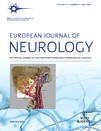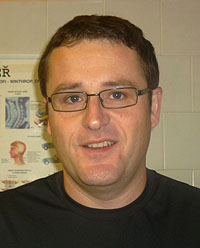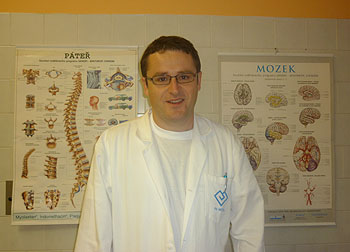 EFNS guidelines for the diagnosis and management of Alzheimer's disease
EFNS guidelines for the diagnosis and management of Alzheimer's disease
Hort J, O'Brien JT, Gainotti G, Pirttila T, Popescu BO, Rektorova I, Sorbi S, Scheltens P; on Behalf of the EFNS Scientist Panel on Dementia. Eur J Neurol. 2010 May 5. IF: 2.732

Assoc. Prof. Jakub Hort, M.D., Ph.D., from the Department of Neurology is the first author of above stated guidelines for the diagnosis and management of Alzheimer's disease and other dementias. These guidelines were published in European Journal of Neurology, journal of European Federation of Neurological Societies. It is an extraordinary and prestigious issue!
Congratulations!
On this occasion an interview for our web pages was made (in Czech).
-az-
 Abstract:
Abstract:
Background and objectives: In 2008 a task force was set up to develop a revision of the European Federation of the Neurological Societies (EFNS) guideline for the diagnosis and management of Alzheimer's disease (AD) and other disorders associated with dementia, published in early 2007. The aim of this revised international guideline was to present a peer-reviewed evidence-based statement for the guidance of practice for clinical neurologists, geriatricians, psychiatrists, and other specialist physicians responsible for the care of patients with AD. Mild cognitive impairment and non-Alzheimer dementias are not included in this guideline. Methods: The task force working group reviewed evidence from original research articles, meta-analysis, and systematic reviews, published before May 2009. The evidence was classified and consensus recommendations graded (A, B, or C) according to the EFNS guidance. Where there was a lack of evidence, but clear consensus, good practice points were provided. Results: The recommendations for clinical diagnosis, blood tests, neuropsychology, neuroimaging, electroencephalography, cerebrospinal fluid (CSF) analysis, genetic testing, disclosure of diagnosis, treatment of AD, behavioural and psychological symptoms in dementia, legal issues, counselling and support for caregivers were all revised as compared with the previous EFNS guideline. Conclusion: A number of new recommendations and good practice points are made, namely in CSF, neuropsychology, neuroimaging and reviewing non-evidence based therapies. The assessment, interpretation, and treatment of symptoms, disability, needs, and caregiver stress during the course of AD require the contribution of many different professionals. These professionals should adhere to these guideline to improve the diagnosis and management of AD.